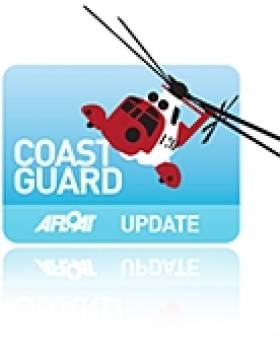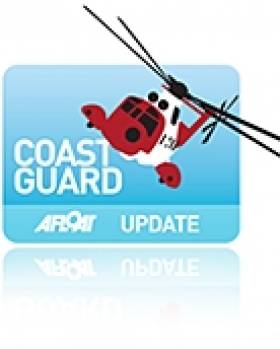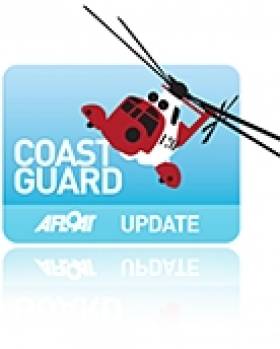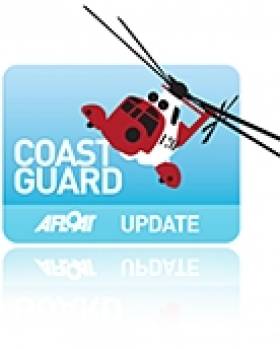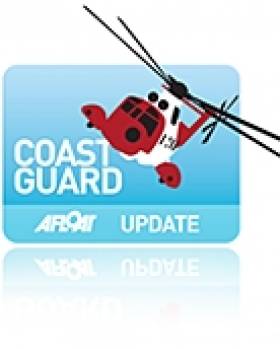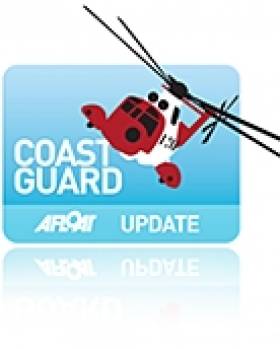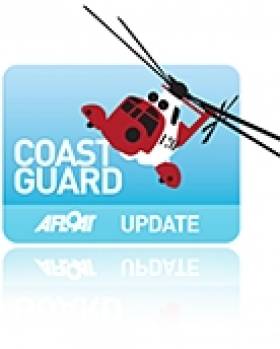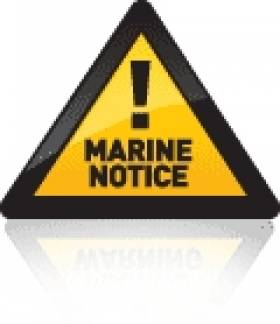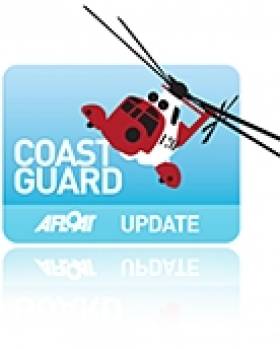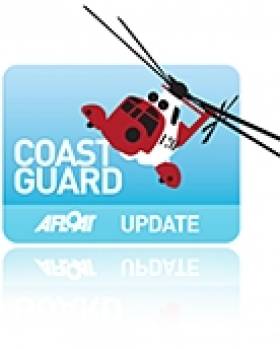Displaying items by tag: Coast Guard
Coast Guard Finds Child at Base of Cliff
#coastguard – Belfast Coastguard coordinated the search yesterday evening for a child who was missing near cliffs close to the Silvercliff Caravan Park at Ballycastle.
The Ballycastle and Coleraine Coastguard Rescue Teams, a Police helicopter, the rescue helicopter from RAF Prestwick and the Portrush and Red Bay RNLI lifeboats all searched for the missing child after Belfast Coastguard received reports that the child was missing.
The child was found at the base of the cliffs and has been taken by the RAF helicopter to Coleraine Hospital.
RNLI add:
RNLI lifeboats from Portrush and Red Bay involved in search for child in Ballycastle
Two volunteer lifeboat crews were involved last night in the search for a child who was missing near cliffs at Ballycastle, County Antrim.
The RNLI lifeboats from Portrush and Red Bay were launched at 7.20pm last night (15 June) and once on scene commenced an intensive search along the coast and in the Ballycastle area.
The child was found at the base of the cliffs and was taken by the RAF helicopter to Coleraine Hospital.
Sadly it has been announced that the child has died and the RNLI lifeboat volunteers at both Red Bay and Portrush wish to offer their deepest sympathies to the family.
Coastguard Oil Spill Equipment Tested on Belfast Lough
#marinepollution – New high-tech equipment that can be deployed anywhere in the UK to clean up oil spills is today being put to the test in Belfast Harbour.
The Maritime and Coastguard Agency (MCA) has recently purchased two new pieces of equipment known as the NOFI Current Buster 6. This is the very latest in up to date technology and was developed following the Deepwater Horizon oil spill response in 2010.
The latest piece of kit can operate five times faster, as the hydrodynamic shape reduces the drag force and allows the system to move more easily through the water. This model also has debris nets, wave dampers and a splash-over cover to avoid spillages. With an oily water separator it has a temporary storage capacity of 70m2.
The MCA is often called upon to deal with a wide range of pollution incidents off the UK coast and has a detailed plan of action and equipment in place to deal with such issues.
Gail Robertson, the MCA's Counter Pollution Resource Manager, said:
"The Maritime and Coastguard Agency has a thorough response procedure in place to deal with many different types of emergencies at sea that cause pollution, or threatens to cause pollution.
"Demonstrations like the one in Belfast Harbour today show how our equipment is fit for purpose. These two NOFI Current Buster 6 will enhance and boost our response capability around the whole of the UK."
Attending the demonstration, Environment Minister Mark H Durkan said:
"There have been some major oil spills at sea in recent years in other parts of the world, which caused devastating damage to the marine and coastal environment and to the wider economy in those regions. Given that the North of Ireland imports all of its oil by sea and that several major shipping routes pass close to our coast, it is not inconceivable that a serious marine oil spill could occur on or close to our coastline. It is therefore vital that we tackle such incidents with the most modern of technology. The fact that we now have equipment which is five times faster in cleaning up such serious pollution is most welcome."
#coastguard – The Irish Coast Guard has today issued advice to members of the public in advance of the June Bank Holiday in relation to Water Safety, Cliff Walking and other Water sports and Coastal Activities.
Throughout the summer (as at other times of the year), Irish Coast Guard Units throughout the country will patrol our rivers, lakes, waterways and coastlines issuing safety advice and information to holidaymakers and tourists. Traditionally over the Bank Holiday weekend many people take to the water and enjoy outdoor active weekends, including cliff walking and this weekend the Irish Coast Guard begin their Summer Safety campaign.
Speaking ahead of the weekend Declan Geoghegan, Manager at the Irish Coast Guard, said "With the warmer weather and bank holiday weekend we are expecting more people to enjoy water and coastline activities but we would remind people to be safety conscious when engaged in such activities. Water sports are a popular and enjoyable pastime but we ask people to heed the advice and if you see someone in difficulty dial 112/999 and ask for the Coast Guard."
Last year the Coast Guard saw an increase in incidents and is urging everyone to heed the advice and enjoy the water and coastal activities in a safe manner over the bank holiday weekend and throughout the summer:
Swimming
Only swim at beaches and waterways that have lifeguards on duty and pay attention to the safety flags, avoid locks and weirs. Ask the Lifeguard for advice about safety and water conditions and adhere to their instructions.
Never go out on the water, including rivers and lakes, having consumed alcohol.
Be able to swim. Get the proper training to stay safe.
Never go out alone.
Familiarise yourself with the local area, be aware of your own capabilities.
Swim parallel to the shore and not in deep water.
Keep warm before and after swimming.
Have a means of alerting the emergency services.
Avoid using inflatable toys, such as lilos and rubber rings, on the water.
Cliff Walking
There is safety in numbers, so never be alone if possible. Let somebody know when and where you are going and what time you will be back. Stay well away from the cliff edge, both top and bottom. Don't attempt to rescue people or pets if they fall over the edge. If assistance is required dial 112/999 and ask for the Coast Guard.
Water Sports and Coastal Activities
Before going to sea check local weather conditions and tides in the area. Personal Flotation Devices include lifejackets and buoyancy aids. It is vital to wear a lifejacket or buoyancy aid if your activity takes you near the water. This doesn't just mean the sea – it includes lakes and rivers too. If you enjoy sports like jetskiing, windsurfing, water skiing and canoeing, wearing the appropriate Personal Floatation Device will give you added confidence when in the water. Also, in the event of an emergency, it will help you remain afloat while the Search and Rescue services locate you. Lifejackets are of no use unless they are worn. Ensure your craft is fit for purpose. Always advise someone as to where you are going and the time of your intended return. Do not overload the craft. If you are in difficulty or see someone in difficulty and requiring assistance dial 112/999 and ask for the Coast Guard.
For specific advice and information on any water and coastal activity, visit www.safetyonthewater.ie.
Also the Irish Coast Guard provide free waterproof wristbands for children to assist the emergency services in contacting a parent or guardian should it be required. These wristbands distributed last year as part of the "Give us a Hand" campaign can be attained at Coast Guard stations nationwide.
#coastguard – A search is ongoing for a man missing in Lough Erne last night after a boat with six people onboard overturned.
Belfast Maritime Rescue Coordination Centre received a 999 call at 6.15pm from a member of the public, close to Portora Boat Club, Enniskillen. The caller reported that a rowing boat had capsized off the boat club.
Two of the vessels for hire in the Lough had rescued five people but one is still missing. He is not believed to have been wearing a lifejacket.
Enniskillen Coastguard Team were sent to the scene to search the shoreline whilst RNLI lifeboats based in Enniskillen and Carrybridge were sent to search the water. The Irish Coast Guard helicopter based at Sligo has also joined the search along with a PSNI boat.
The five people recovered from the water where treated by the Northern Ireland Ambulance Service.
Gary Young Watch Manager said:
"An extensive search is continuing at this time and weather conditions are favourable in the area."
Men Rescued From Capsized Dinghy in Firth of Clyde
#rescue – Two men have been rescued after their small dinghy overturned in the Firth of Clyde.
They clung onto the hull before being swept away from the dinghy by the choppy waves. Belfast Coastguard asked a Royal Navy minesweeper on patrol near Ailsa Craig, which lies about 10 miles off the Scottish coast, to rescue the men there this afternoon.
The men let off a distress flare to guide HMS Blyth to them. Girvan all-weather lifeboat, Girvan Coastguard Rescue Team, and the Royal Navy helicopter from Prestwick also attended the incident.
Liam Colquhoun, Watch Manager at Belfast Coastguard, said: "The minesweeper rescued the two casualties within 20 minutes of the initial call being made.
"They were cold and wet and were checked over by the minesweeper's medical team. They weren't injured.
"Fortunately, they were wearing lifejackets and carrying flares."
The two men are being taken back to Girvan in the all-weather lifeboat.
#rescue – An elderly man with a walking aid was rescued from soft sand just 50 metres off the prom in Morecombe today after he sank up to his knees.
At just before 11.30 this morning Liverpool Maritime Rescue Coordination Centre received a 999 call from a member of the public. He told the coastguard about the elderly gentleman's predicament. The specialist coastguard mud rescue teams from Morecombe and Knott End were immediately sent to the scene with the RNLI hovercraft based in Morecombe and the Lancashire Fire and Rescue Service mud team.
The elderly man was extracted from the soft sand by the coastguard rescue teams and fire and rescue service. He was brought ashore by the RNLI hovercraft before receiving medical attention and being taken to hospital by the North West Ambulance Service.
Watch Manager Stuart Atkinson who coordinated today's rescue said:
"The winter storms have moved the sand around offshore. This means that areas that were safe to walk are now areas of dangerous soft sand.
"Please take care if you are out on the sands. If you become stuck try to spread your weight as much as possible. If you have a mobile phone call 999 and ask for the coastguard."
#coastguard – Minister for Transport, Tourism & Sport Leo Varadkar has opened the newly-built Coast Guard Station in Killybegs which provides the voluntary crew with top-class accommodation and training facilities.
It's the third new Coast Guard building opened by Minister Varadkar since the election, and a fourth new premises will open at Doolin in the next few months. Minister Varadkar is hoping to open at least one new Coast Guard facility every year for the life-saving Coast Guard volunteers.
Minister Varadkar also confirmed that the Coast Guard has commenced a new round of recruitment for radio officers for its three monitoring stations in Dublin, Valentia and Malin.
Speaking at the opening, Minister Varadkar said: "I'm delighted to open this superb, purpose-built Irish Coast Guard Station and pollution control centre. I want to thank the Coast Guard volunteers for their service and dedication to our coastal communities. This commitment is truly impressive and the Government is acutely aware of its importance. I'm pleased to announce that since my appointment as Minister, this is the third new station that we have opened for the Coast Guard volunteer sector."
The new Coast Guard station is located at the inner mouth of Killybegs Harbour on the new pier. The combined facility consists of a three story Coast Guard Station and an adjoining single storey Pollution Control Store. It provides volunteers with a safe and comfortable working environment, and secure, water-proof storage facilities for their life-saving equipment.
The Pollution Control Store at Killybegs is one of three regional centres used by the Coast Guard. It provides a base for the 25 volunteer members of the Killybegs Coast Guard team who are trained and equipped to operate as a boat team, cliff rescue and coastal search unit.
Irish Coast Guard Director Chris Reynolds said: "I am delighted to have this opportunity to welcome our many friends to Killybegs today on what is a proud day for Killybegs and its harbour. I extend a special welcome to representatives of the statutory and voluntary services including the Gardaí, RNLI, HSE, Navy, Fire Service and local authorities. I wish to thank Killybegs Coast Guard Unit for their many years of service to their community."
Killybegs Coast Guard Unit Officer in Charge Arthur Kee said: "This is a special day for the volunteer members of Killybegs Coast Guard Unit, for the town and surrounding community. On behalf of the unit I would like to thank the Minister and all those involved with the project including the OPW, Donegal County Council, the Department of Agriculture, Food & the Marine, whose assistance with site provision is greatly appreciated, and the local Harbour Master Martin Connell."
Since 2011 new Coast Guard buildings have been opened in Goleen in West Cork, and Crosshaven in Co. Cork. The new buildings are a huge leap forward for the volunteers and replace the old garage buildings known as 'rocket houses'.
The new Coast Guard Station at Doolin, the busiest Coast Guard Station in Ireland, is expected to open within the next few months. Meanwhile planning is underway for new Stations at Westport in Co. Mayo and Greystones in Co. Wicklow.
Coast Guard Appeal to Exercise Caution During 'Red Alert' Severe Weather
#storm – Members of the public have been urged to exercise extreme caution on exposed coastal areas this afternoon as Met Éireann issues an red alert.
Met Éireann has a red weather alert in force. Coastal areas will experience winds increasing from storm force 10 to violent storm with some severe gusts this afternoon.
The Coast Guard particularly appeal to people to use common sense and not to place themselves in danger.
The Coast Guard strongly advises the public to stay away from exposed piers, cliff walks, harbour walls, beaches, promenades or any other coastal areas during the stormy weather.
Remember to monitor weather broadcasts when travelling and heed the advice of the RSA on road use during severe weather and high winds.
Specific advice from the Coast Guard is:
• The public is advised to stay away from the shoreline and to avoid engaging in water sports
• Do not venture out unnecessarily when gale force conditions are forecast
• Avoid exposed coasts, cliff paths and coastal areas during inclement weather
• Owners of small vessels and fishing vessels in coastal waters should seek shelter and secure them properly with moorings.
If you do see someone in difficulty in the sea, on the shore, cliffs, lakes or rivers dial 999 or 112 and ask for the Coast Guard.
Joint Garda Síochána & Coast Guard Appeal for Caution During weekend Stormy Weather
#orangealert – Members of the public have been urged to heed the advice of An Garda Síochána and the Coast Guard as Met Éireann issues an orange alert for Gale warning and a yellow alert for risk of localised flooding.
An Garda Síochána and Coast Guard particularly appeal to parents/guardians with children to use common sense and not to place their loved ones in danger.
Exercise great care on exposed piers, cliff walks and waterways prone to flooding and swift flowing water during the stormy weather over the coming weekend and next week.
Superintendent David Taylor, Garda Press Officer, said: "People need to recognise the destructive and dangerous power of nature and exercise extreme caution when close to areas such as cliff walks, harbours, rivers and lakes."
Coast Guard Chief of Operations Eugene Clonan said: "It is important for parents to be especially vigilant over the next few days and use common sense when taking children out near the coast or inland water ways".
Passengers Rescued After Wave Hits Bus in Pembrokeshire
#coast guard – Ten people have been rescued after the bus they were travelling on was hit by a large wave in Newgale in Wales.
Milford Haven Coastguard was contacted just after 7pm this evening with reports that the bus was stuck on the seafront, having been hit by a large wave and was surrounded by water. The wind at the time was gusting over 50mph.
Broadhaven and St. Davids Coastguard Rescue Teams, HM Coastguard’s Sector Manager for Preseli, along with police, fire and ambulance crews were sent to the scene. The RAF search and rescue helicopter from RMB Chivenor was also asked to assist, but was stood down once the passengers were helped to safety by rescue units on scene. There are no reported injuries.
Steve Matthews, Watch Manager at Swansea Coastguard, said:
"There are tricky conditions on the sea and along the coast tonight, with gale force winds, high tides and heavy rain.
"Our advice is simple, please don’t take risks. But if you do get into difficulty, or spot someone who might be in trouble, call 999 and ask for the Coastguard.”



























